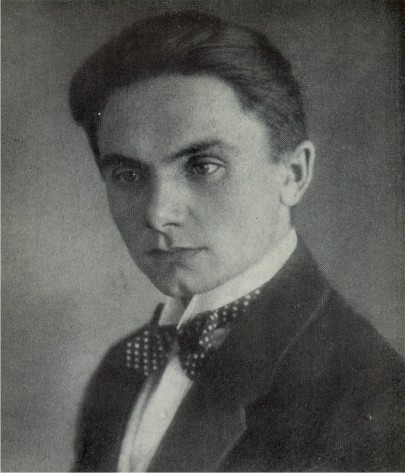Krushelnytsky, Marian
Krushelnytsky, Marian [Krušel'nyc'kyj, Mar’jan], b 18 April 1897 in Pyliava, Buchach county, Galicia, d 5 April 1963 in Kyiv. Actor and play director of Les Kurbas’s school; educator; husband of Yevheniia Petrova. Making his stage debut in 1915 in the Ternopilski Teatralni Vechory theater, he subsequently acted in the Ukrainian Theater in Ternopil (1918, 1920–1), the New Lviv Theater (1919), the Franko New Drama Theater in Vinnytsia (1920), and the Ukrainska Besida Theater in Lviv (1922–4). In 1924 Krushelnytsky moved to Soviet Ukraine. He was one of the leading actors of the Berezil theater in Kyiv and Kharkiv, and after Les Kurbas’s arrest and the dissolution of Berezil, Krushelnytsky was appointed in 1934 artistic director and chief play director of the Kharkiv Ukrainian Drama Theater. He modified the theater’s profile, particularly its repertoire, according to the demands of socialist realism: preference was given to Oleksander Korniichuk’s and Liubomyr Dmyterko’s plays and Russian classics. Joining the Kyiv Ukrainian Drama Theater in 1952, he eventually became its chief stage director (1954–63). After the Second World War, he also taught acting at the Kharkiv Theater Institute (1946–52) and the Kyiv Institute of Theater Arts (1952–63). He was instrumental in the process of preserving some elements of Les Kurbas’s ‘system’ and passing them on to the next generation of actors and directors in the late 1950s and the early 1960s.
As an actor Krushelnytsky distinguished himself under Les Kurbas’s direction in the Berezil theater. He played a wide range of roles, including Honoré d’Apremout in Prosper Mérimé’s La Jacquerie, Barbulesque in F. Crommelynck’s Tripes d’Or, and Maloshtan in Ivan Mykytenko’s Dyktatura (Dictatorship). He was particularly impressive in Mykola Kulish’s plays: as Malakhii in Narodnyi Malakhii (The People’s Malakhii), Uncle Taras in Myna Mazailo, and Padura in Maklena Grasa. In the post-Berezil period his better roles were comedic ones such as Kuksa in Marko Kropyvnytsky’s Poshylys' u durni (They Made Fools of Themselves) and Ivan Nepokryty in his Dai sertsiu voliu zavede v nevoliu (Give the Heart Freedom and It Will Lead You into Slavery), the title role in Ivan Karpenko-Kary’s Martyn Borulia, Kindrat Halushka in Oleksander Korniichuk’s V stepakh Ukraïny (In Ukraine’s Steppes), and cantor Havrylo in Bohdan Khmel'nyts'kyi. Krushelnytsky won acclaim for his original interpretation of Tevie in Tevie-molochnyk (Tevie, the Milkman, based on the story by Sholom Aleichem) and of Lear in William Shakespeare’s King Lear.
BIBLIOGRAPHY
Han, Ia. Mar’ian Mykhailovych Krushel'nyts'kyi (Kyiv 1960)
Taniuk, L. Mar’ian Krushel'nitskii (Moscow 1974)
Hirniak, I. Spomyny (New York 1982)
Valerian Revutsky
[This article originally appeared in the Encyclopedia of Ukraine, vol. 2 (1988).]

.jpg)
.jpg)
.jpg)
.jpg)
.jpg)

.jpg)
.jpg)